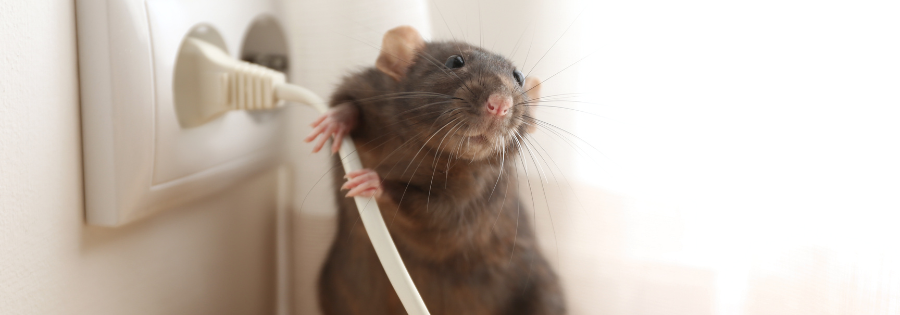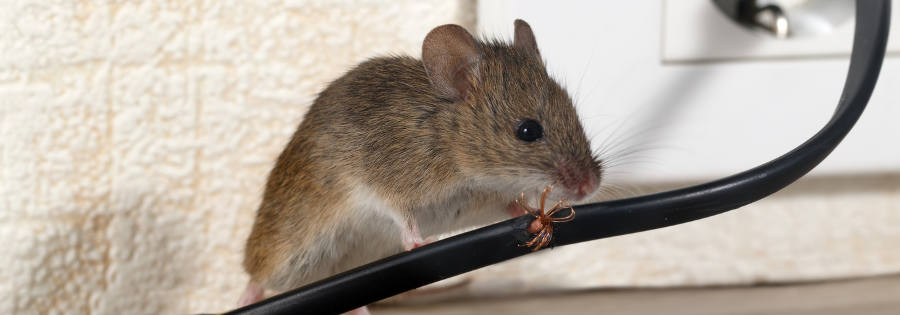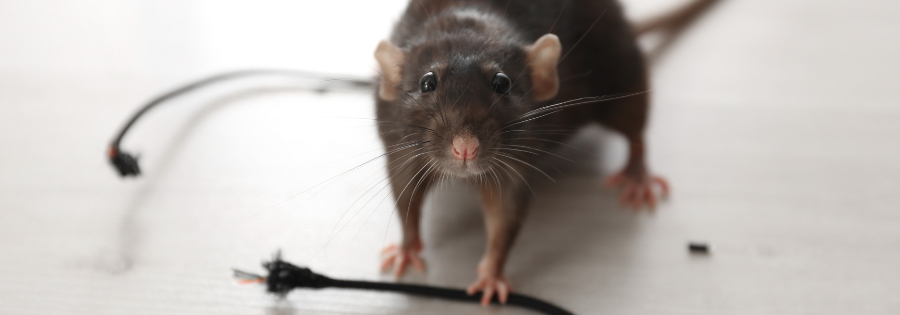Protecting Electrical Wires from Rats: How to Prevent Rodent Damage

Have you ever wondered why rats chew on electrical wiring and what you can do to prevent it? The proactive pest control experts at Coastal Spray break it down in this guide.
Why Do Rats Chew on Electrical Wiring?
Rats chew on electrical wires primarily for instinct, necessity, and dental health. Their constant need to chew is an innate instinct to keep their teeth from growing too long. Gnawing on various objects, including electrical wires, helps wear down their ever-growing incisors.
Additionally, rats may gnaw on wires to create paths or nests for shelter, seeking safe havens in dark and secluded spaces. Unfortunately, this behavior poses significant risks, leading to potential electrical fires, equipment malfunctions, and costly repairs.
The Dangers of Rats Chewing on Electrical Wires
Rats and mice chewing on electrical wires can pose significant dangers. When rats, mice, or squirrels chew through the protective covering of cables, they expose the bare metal surfaces of the wires. This can lead to short circuits, electrical fires, and even electrocution.

Preventive Measures to Protect Electrical Wires from Rodents
To protect electrical wires from rodents, there are several preventive measures you can take:
Eliminate Rodent Access Points
Seal any cracks, crevices, or holes in and around your home. Use materials like spray foam insulation or masonry repair to fill larger gaps. This will prevent rodents from entering your property and reaching your electrical wiring.
Keep the Area Clean
Remove any clutter or debris that may attract rodents. Rodents are drawn to nesting materials such as cardboard boxes and fabrics, so keeping your surroundings tidy and free from potential nesting spots is important.
Cover Exposed Wires
Rodents are known to gnaw on wires, which can lead to electrical hazards. Protect your electrical wiring by covering exposed wires with plastic or steel conduits. This physical barrier will make it difficult for rodents to access and damage the wires.
Use Rodent Repellents
There are sprays available in the market that act as deterrents for rodents. Apply these repellents near electrical wiring or areas where rodents can access and chew on the wires. This extra layer of protection can discourage rodents from damaging your electrical system.
Regular Maintenance and Inspections
Perform regular electrical system inspections to identify any signs of a pest infestation or rodent activity. Look for chew marks, droppings, or nests near your electrical wiring. If you notice any issues, take immediate action to resolve them.
It’s important to note that while these preventive measures can significantly reduce the risk of rodent damage to electrical wiring, professional assistance may be required if you already have a significant rodent infestation. Commercial pest control services can help address the root cause of the problem.

Steps To Take If Rats Have Already Damaged Electrical Wires
If a rat or mouse has already chewed your wires, it is important to take immediate action to prevent further damage and ensure safety. Here are the steps you can take:
- Turn Off the Power: Before doing anything, turn off the power supply to the affected area. This will help prevent electrical shocks or fires while working on the wires.
- Inspect the Damage: Carefully examine the extent of the damage caused by the rats. Look for any exposed wires, chewed insulation, or signs of burning. Take note of the areas that need repair or replacement.
- Call A Professional Electrician: It is highly recommended to contact a licensed electrician to handle the repairs. They have the expertise and knowledge to safely fix the electrical wiring and ensure it meets the necessary safety standards.
- Clean the Area: Remove any rat droppings, nests, or debris from the affected area. Use gloves and a mask to protect yourself from potential health hazards associated with rodent waste.
- Rodent Control Measures: Address the rat infestation to prevent further damage. Seal any entry points the rats may have used to access your property. Consider using traps or contacting an industrial pest control professional to help eliminate the rats.
- Repair or Replace Damaged Wires: Once the electrician arrives, they will assess the damage and determine the best course of action. This may involve repairing or replacing the damaged wires, connectors, or insulation.
- Test the Electrical System: After the repairs are completed, the electrician will test the electrical system to ensure it functions properly and safely. They may also recommend additional measures, such as installing rodent-proofing materials, to prevent future damage.
Remember, dealing with electrical wires can be dangerous, so it is crucial to prioritize safety and seek professional assistance when needed.
Have Peace of Mind with Coastal Spray Expert Pest Control Services
Are you facing a persistent rodent problem that’s causing stress and concern in your commercial business or industrial facility? Look no further than that. Our commercial grounds maintenance company has the experience and knowledge to tackle pest infestations effectively, providing tailored solutions to fit your unique needs. Don’t let rodents take over your space; take the first step towards a pest-free environment by contacting Coastal Spray today. Trust us to handle the critters so that you can enjoy a comfortable and rodent-free space once again.
Contact us today to learn more about our various types of pest control services.